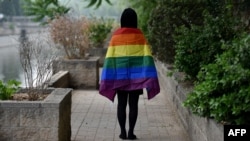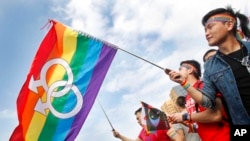The 15-year-old Beijing LGBT Center, one of the pioneers of the "different sexual orientation movement" in China, announced this week that it had terminated its operations without explanation.
Analysts said the closure of the well-known rights center was seen as inevitable and a reflection of the increasingly repressive political environment in China under Xi Jinping.
The LGBT Center released a statement on its social media accounts Monday evening, announcing that the center would cease operations "due to force majeure." That legal phrase typically refers to events outside a party's control, although the message did not elaborate on the reasons.
VOA Mandarin left a message on the center's account but has not received a response.
As part of its public mission, the LGBT Center was committed to improving the environment for sexual minorities in China. Its main business included providing psychological counseling, rapid HIV screening and "gender-friendly workplace training" to promote gender diversity and prevent discrimination.
The center has also sued organizations that administer electroshock therapy to homosexuals.
Jennifer Lu, Asia program director of Outright International, a group focused on improving rights for sexual minorities around the world, has long been concerned with the situation in China.
In an interview with VOA Mandarin, she said the sudden closure of the center was a shame, but that she wasn't surprised by it. She said many sexual minority activists have told her that they are unable to organize events in China and that there are fewer and fewer outlets to speak out.
"There are quite a few Chinese LGBT groups," Lu said, "who may be warned by the public security officers or friends before they hold an event that 'this event has to be canceled.' The worrying thing is that the people who try to talk them out of the events don't necessarily use a strong tone, but often hint, 'I know what you're doing.'
"Or, the person who delivers the message would say, 'I know you've had these conversations.' These 'conversations' are usually private or internal discussions. You then realize that some of the discussions or events that you prepare for are not secure. They are being monitored at all times."
Homosexuality was decriminalized in China in 1997, but in recent years Beijing has officially restricted some kinds of LGBT content on television and social media. In 2017, the country's broadcasting authority banned the depiction of homosexuality, including it in the category of "abnormal sexual behavior" similar to incest. But a proposal in 2018 to ban all gay content from Weibo, the country's popular social media service, was reversed after public outcry.
All LGBT groups at risk?
In 2020, the Shanghai Pride Festival, China's largest multigender event, was discontinued, presumably because of pressure from Chinese authorities on the organizers.
In 2021, social media accounts of sexual minority communities at several Chinese universities were shut down by WeChat, China's biggest social media platform.
According to Lu, in the past few years, several Chinese sexual minority groups, including the Beijing LGBT Center, have faced various restrictions from the government and have planned to cease their operations, but some of them have been prevented from doing so by the authorities.
Lu told VOA Mandarin: "Some groups think, 'We might as well just shut down,' since they can't hold events or do promotion or raise funds. But this is what the authorities want to avoid - to give the public an impression that civil society still exists. They don't want to draw too much attention when they carry out their so-called stability policy; they don't want controversy."
The Beijing LGBT Center was a place for people "to go to when they are under pressure in society or in their families, or to seek help when they are in trouble," Lu said. "This is a very important and basic service in the LGBT movement. That's why people were so shocked by the sudden closure of the center."
Taiwan amends gay marriage rules
In 2019, Taiwan's Legislative Yuan passed the Special Act on Same-Sex Marriage, becoming the first country in Asia to allow same-sex marriage, but the regulations stipulated that married same-sex couples could adopt only children biologically related to one of the partners. The law was amended Tuesday when Taiwan's Legislative Yuan passed an amendment to officially open all adoptions to same-sex couples.
In January, Taiwan expanded the reach of same-sex marriage. Taiwanese citizens can register for marriage in Taiwan regardless of whether the spouse's home country or region allows gay marriage, with one exception — China.
Qi Jiawei, a veteran gay rights activist in Taiwan, told VOA Mandarin that Taiwan is now leading Asia in same-sex marriage legislation.
"Taiwan opened transnational [gay marriage] in the Lunar New Year of 2023. Homosexual people from any country in the world can get married in Taiwan, except those from mainland China," Qi said.
"The adoption from gay couples was not open at first, so Taiwan fixed this problem by making an amendment. So the last issue is solved now."
Bo Gu contributed to this report.





